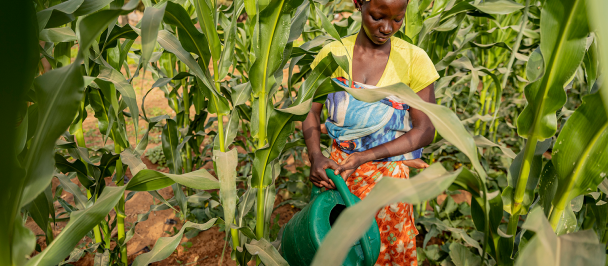Côte d'Ivoire has one of the world's fastest rates of deforestation, which is increasingly driven by unsustainable agricultural commodity production. Together with Cocoa Life, a major sustainability programme supported by Mondelēz International, the world's largest chocolate company, we developed a set of recommendations for forest-friendly cocoa in the country. These are captured in a joint discussion paper released by UNDP today. Below is a conversation about this paper between Cédric van Cutsem, Global Operations Manager for Cocoa Life and Andrew Bovarnick, Global Head of the UNDP Green Commodities Programme.
Cédric van Cutsem: Over the past few decades, Côte d’Ivoire has seen extensive deforestation. The forests have dwindled from 16 million hectares to 4 million [about 60,000 square miles to 15,000]. In 2016, Cocoa Life organized a field visit to the country for its external advisors. There, we heard from cocoa farmers who shared how climate change, of which deforestation is a main driver, has impacted their lives.
Andrew Bovarnick: During that trip, I met with Mondelēz cocoa suppliers. I asked what each was doing in regards to their sourcing policies relating to deforestation. All of them expressed commitment. They were working on mapping where their cocoa came from. But there seemed to be a knowledge gap on the next step once they identified the farmers who were deforesting. Do you continue to buy from them, or leave it up to the government to decide what to do with cocoa producers encroaching into forest? The discussions revealed the complexity of the issue. There are environmental, social, economic, and legal aspects to consider when you identify those farmers. How do you respond? The purpose of this joint discussion paper is to lay out these issues and offer companies suggestions that they should consider when developing their standard operating procedures for dealing with deforestation in their supply chains. Our goal was to propose policies that companies should be following in conjunction with the government.
Cédric van Cutsem: I’m pleased that the dialogue with our stakeholders led to this paper and its recommendations. At Mondelēz International, we’re leading the way in protecting forests. But our partnerships will be key to success in this area — we are not working alone.
Andrew Bovarnick: Neither government nor companies can change the systems that influence farmers’ decisions by acting alone. Only when both work together will change happen. This paper is important because it was written jointly by the UNDP Green Commodities Programme, Mondelēz Cocoa Life and the REDD+ (Reducing Emissions from Deforestation and Forest Degradation) Permanent Secretariat in Côte d’Ivoire. It spells out a five-step strategy for reducing deforestation.
Cédric van Cutsem: The recommendations are aligned with those in Cocoa Life’s position paper on climate change published last month. There, we updated our strategy along three areas: produce, protect, and people. This joint UNDP paper is a follow-up, focusing on the protection of forests.
Andrew Bovarnick: It also looks ahead and proposes ideas for what companies and the government should do if deforestation is identified in the supply chain.
Cédric van Cutsem: It’s not easy to get all of the stakeholders on the same page. That’s where the UNDP can play a key role in creating partnerships, eventually leading to new policies and the right framework for their enforcement. At the same time, we at Cocoa Life will continue to innovate with Conseil du Café Cacao’s Forest Friendly Cocoa pilot program in Nawa, and apply an environmental focus to our community action plans. It’s ongoing work, but we’re improving every day.

 Locations
Locations



